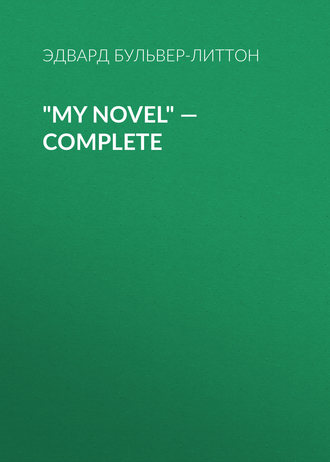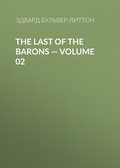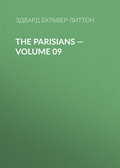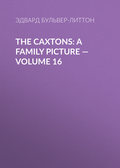
Эдвард Бульвер-Литтон
"My Novel" — Complete
CHAPTER IX
Shortly after this discourse of Riccabocca’s, an incident occurred to Leonard that served to carry his mind into new directions. One evening, when his mother was out, he was at work on a new mechanical contrivance, and had the misfortune to break one of the instruments which he employed. Now it will be remembered that his father had been the squire’s head carpenter: the widow had carefully hoarded the tools of his craft, which had belonged to her poor Mark; and though she occasionally lent them to Leonard, she would not give them up to his service. Amongst these Leonard knew that he should find the one that he wanted; and being much interested in his contrivance, he could not wait till his mother’s return. The tools, with other little relies of the lost, were kept in a large trunk in Mrs. Fairfield’s sleepingroom; the trunk was not locked, and Leonard went to it with out ceremony or scruple. In rummaging for the instrument his eye fell upon a bundle of manuscripts; and he suddenly recollected that when he was a mere child, and before he much knew the difference between verse and prose, his mother had pointed to these manuscripts, and said, “One day or other, when you can read nicely, I’ll let you look at these, Lenny. My poor Mark wrote such verses—ah, he was a schollard!” Leonard, reasonably enough, thought that the time had now arrived when he was worthy the privilege of reading the paternal effusions, and he took forth the manuscripts with a keen but melancholy interest. He recognized his father’s handwriting, which he had often seen before in account-books and memoranda, and read eagerly some trifling poems, which did not show much genius, nor much mastery of language and rhythm,—such poems, in short, as a self-educated man, with poetic taste and feeling rather than poetic inspiration or artistic culture, might compose with credit, but not for fame. But suddenly, as he turned over these “Occasional Pieces,” Leonard came to others in a different handwriting,—a woman’s handwriting, small and fine and exquisitely formed. He had scarcely read six lines of these last, before his attention was irresistibly chained. They were of a different order of merit from poor Mark’s; they bore the unmistakable stamp of genius. Like the poetry of women in general, they were devoted to personal feeling,—they were not the mirror of a world, but reflections of a solitary heart. Yet this is the kind of poetry most pleasing to the young. And the verses in question had another attraction for Leonard: they seemed to express some struggle akin to his own,—some complaint against the actual condition of the writer’s life, some sweet melodious murmurs at fortune. For the rest, they were characterized by a vein of sentiment so elevated, that, if written by a man, it would have run into exaggeration; written by a woman, the romance was carried off by so many genuine revelations of sincere, deep, pathetic feeling, that it was always natural, though true to a nature for which you would not augur happiness.
Leonard was still absorbed in the perusal of these poems when Mrs. Fairfield entered the room.
“What have you been about, Lenny,—searching in my box?”
“I came to look for my father’s bag of tools, Mother, and I found these papers, which you said I might read some day.”
“I does n’t wonder you did not hear me when I came in,” said the widow, sighing. “I used to sit still for the hour together, when my poor Mark read his poems to me. There was such a pretty one about the ‘Peasant’s Fireside,’ Lenny,—have you got hold of that?”
“Yes, dear mother; and I remarked the allusion to you: it brought tears to my eyes. But these verses are not my father’s; whose are they? They seem in a woman’s handwriting.”
Mrs. Fairfield looked, changed colour, grew faint and seated herself.
“Poor, poor Nora!” said she, falteringly. “I did not know as they were there; Mark kep’ ‘em; they got among his—”
LEONARD.—“Who was Nora?”
MRS. FAIRFIELD.—“Who?—child—who? Nora was—was my own—own sister.”
LEONARD (in great amaze, contrasting his ideal of the writer of these musical lines, in that graceful hand, with his homely uneducated mother, who could neither read nor write).—“Your sister! is it possible! My aunt, then. How comes it you never spoke of her before? Oh, you should be so proud of her, Mother!”
MRS. FAIRFIELD (clasping her hands).—“We were proud of her, all of us,—father, mother, all! She was so beautiful and so good, and not proud she! though she looked like the first lady in the land. Oh, Nora, Nora!”
LEONARD (after a pause).—“But she must have been highly educated?”
MRS. FAIRFIELD.—“‘Deed she was!”
LEONARD.—“How was that?”
MRS. FAIRFIELD (rocking herself to and fro in her chair).—“Oh, my Lady was her godmother,—Lady Lansmere I mean,—and took a fancy to her when she was that high, and had her to stay at the Park, and wait on her Ladyship; and then she put her to school, and Nora was so clever that nothing would do but she must go to London as a governess. But don’t talk of it, boy! don’t talk of it!”
LEONARD.—“Why not, Mother? What has become of her; where is she?”
MRS. FAIRFIELD (bursting into a paroxysm of tears).—“In her grave,—in her cold grave! Dead, dead!”
Leonard was inexpressibly grieved and shocked. It is the attribute of the poet to seem always living, always a friend. Leonard felt as if some one very dear had been suddenly torn from his heart. He tried to console his mother; but her emotion was contagious, and he wept with her.
“And how long has she been dead?” he asked at last, in mournful accents.
“Many’s the long year, many; but,” added Mrs. Fairfield, rising, and putting her tremulous hand on Leonard’s shoulder, “you’ll just never talk to me about her; I can’t bear it, it breaks my heart. I can bear better to talk of Mark; come downstairs,—come.”
“May I not keep these verses, Mother? Do let me.”
“Well, well, those bits o’ paper be all she left behind her,—yes, keep them, but put back Mark’s. Are they all here,—sure?” And the widow, though she could not read her husband’s verses, looked jealously at the manuscripts written in his irregular, large scrawl, and, smoothing them carefully, replaced them in the trunk, and resettled over them some sprigs of lavender, which Leonard had unwittingly disturbed.
“But,” said Leonard, as his eye again rested on the beautiful handwriting of his lost aunt,—“but you called her Nora—I see she signs herself L.”
“Leonora was her name. I said she was my Lady’s god-child. We call her Nora for short—”
“Leonora—and I am Leonard—is that how I came by the name?”
“Yes, yes; do hold your tongue, boy,” sobbed poor Mrs. Fairfield; and she could not be soothed nor coaxed into continuing or renewing a subject which was evidently associated with insupportable pain.
CHAPTER X
It is difficult to exaggerate the effect that this discovery produced on Leonard’s train of thought. Some one belonging to his own humble race had, then, preceded him in his struggling flight towards the loftier regions of Intelligence and Desire. It was like the mariner amidst unknown seas, who finds carved upon some desert isle a familiar household name.
And this creature of genius and of sorrow-whose existence he had only learned by her song, and whose death created, in the simple heart of her sister, so passionate a grief, after the lapse of so many years—supplied to the romance awaking in his young heart the ideal which it unconsciously sought. He was pleased to hear that she had been beautiful and good. He paused from his books to muse on her, and picture her image to his fancy. That there was some mystery in her fate was evident to him; and while that conviction deepened his interest, the mystery itself by degrees took a charm which he was not anxious to dispel. He resigned himself to Mrs. Fairfield’s obstinate silence. He was contented to rank the dead amongst those holy and ineffable images which we do not seek to unveil. Youth and Fancy have many secret hoards of idea which they do not desire to impart, even to those most in their confidence. I doubt the depth of feeling in any man who has not certain recesses in his soul into which none may enter.
Hitherto, as I have said, the talents of Leonard Fairfield had been more turned to things positive than to the ideal,—to science and investigation of fact than to poetry, and that airier truth in which poetry has its element. He had read our greater poets, indeed, but without thought of imitating; and rather from the general curiosity to inspect all celebrated monuments of the human mind than from that especial predilection for verse which is too common in childhood and youth to be any sure sign of a poet. But now these melodies, unknown to all the world beside, rang in his ear, mingled with his thoughts,—set, as it were, his whole life to music. He read poetry with a different sentiment,—it seemed to him that he had discovered its secret. And so reading, the passion seized him, and “the numbers came.”
To many minds, at the commencement of our grave and earnest pilgrimage, I am Vandal enough to think that the indulgence of poetic taste and revery does great and lasting harm; that it serves to enervate the character, give false ideas of life, impart the semblance of drudgery to the noble toils and duties of the active man. All poetry would not do this,—not, for instance, the Classical, in its diviner masters; not the poetry of Homer, of Virgil, of Sophocles; not, perhaps, even that of the indolent Horace. But the poetry which youth usually loves and appreciates the best—the poetry of mere sentiment—does so in minds already over-predisposed to the sentimental, and which require bracing to grow into healthful manhood.
On the other hand, even this latter kind of poetry, which is peculiarly modern, does suit many minds of another mould,—minds which our modern life, with its hard positive forms, tends to produce. And as in certain climates plants and herbs, peculiarly adapted as antidotes to those diseases most prevalent in the atmosphere, are profusely sown, as it were, by the benignant providence of Nature, so it may be that the softer and more romantic species of poetry, which comes forth in harsh, money-making, unromantic times, is intended as curatives and counter-poisons. The world is so much with us, nowadays, that we need have something that prates to us, albeit even in too fine a euphuism, of the moon and stars.
Certes, to Leonard Fairfield, at that period of his intellectual life, the softness of our Helicon descended as healing dews. In his turbulent and unsettled ambition, in his vague grapple with the giant forms of political truths, in his bias towards the application of science to immediate practical purposes, this lovely vision of the Muse came in the white robe of the Peacemaker; and with upraised hand pointing to serene skies, she opened to him fair glimpses of the Beautiful, which is given to Peasant as to Prince,—showed to him that on the surface of earth there is something nobler than fortune, that he who can view the world as a poet is always at soul a king; while to practical purpose itself, that larger and more profound invention, which poetry stimulates, supplied the grand design and the subtle view,—leading him beyond the mere ingenuity of the mechanic, and habituating him to regard the inert force of the matter at his command with the ambition of the Discoverer. But, above all, the discontent that was within him finding a vent, not in deliberate war upon this actual world, but through the purifying channels of song, in the vent itself it evaporated, it was lost. By accustoming ourselves to survey all things with the spirit that retains and reproduces them only in their lovelier or grander aspects, a vast philosophy of toleration for what we before gazed on with scorn or hate insensibly grows upon us. Leonard looked into his heart after the Enchantress had breathed upon it; and through the mists of the fleeting and tender melancholy which betrayed where she had been, he beheld a new sun of delight and joy dawning over the landscape of human life.
Thus, though she was dead and gone from his actual knowledge, this mysterious kinswoman—“a voice, and nothing more”—had spoken to him, soothed, elevated, cheered, attuned each discord into harmony; and if now permitted from some serener sphere to behold the life that her soul thus strangely influenced, verily with yet holier joy the saving and lovely spirit might have glided onward in the Eternal Progress.
We call the large majority of human lives obscure. Presumptuous that we are! How know we what lives a single thought retained from the dust of nameless graves may have lighted to renown?
CHAPTER XI
It was about a year after Leonard’s discovery of the family manuscripts that Parson Dale borrowed the quietest pad-mare in the squire’s stables, and set out on an equestrian excursion. He said that he was bound on business connected with his old parishioners of Lansmere; for, as it has been incidentally implied in a previous chapter, he had been connected with that borough town (and, I may here add, in the capacity of curate) before he had been inducted into the living of Hazeldean.
It was so rarely that the parson stirred from home, that this journey to a town more than twenty miles off was regarded as a most daring adventure, both at the Hall and at the Parsonage. Mrs. Dale could not sleep the whole previous night with thinking of it; and though she had naturally one of her worst nervous headaches on the eventful morn, she yet suffered no hands less thoughtful than her own to pack up the saddle-bags which the parson had borrowed along with the pad. Nay, so distrustful was she of the possibility of the good man’s exerting the slightest common-sense in her absence, that she kept him close at her side while she was engaged in that same operation of packing-up,—showing him the exact spot in which the clean shirt was put; and how nicely the old slippers were packed up in one of his own sermons. She implored him not to mistake the sandwiches for his shaving-soap, and made him observe how carefully she had provided against such confusion, by placing them as far apart from each other as the nature of saddle-bags will admit. The poor parson—who was really by no means an absent man, but as little likely to shave himself with sandwiches and lunch upon soap as the most commonplace mortal may be—listened with conjugal patience, and thought that man never had such a wife before; nor was it without tears in his own eyes that he tore himself from the farewell embrace of his weeping Carry.
I confess, however, that it was with some apprehension that he set his foot in the stirrup, and trusted his person to the mercies of an unfamiliar animal. For, whatever might be Mr. Dale’s minor accomplishments as man and parson, horsemanship was not his forte. Indeed, I doubt if he had taken the reins in his hand more than twice since he had been married.
The squire’s surly old groom, Mat, was in attendance with the pad; and, to the parson’s gentle inquiry whether Mat was quite sure that the pad was quite safe, replied laconically, “Oi, oi; give her her head.”
“Give her her head!” repeated Mr. Dale, rather amazed, for he had not the slightest intention of taking away that part of the beast’s frame, so essential to its vital economy,—“give her her head!”
“Oi, oi; and don’t jerk her up like that, or she’ll fall a doincing on her hind-legs.”
The parson instantly slackened the reins; and Mrs. Dale—who had tarried behind to control her tears—now running to the door for “more last words,” he waved his hand with courageous amenity, and ambled forth into the lane.
Our equestrian was absorbed at first in studying the idiosyncrasies of the pad-mare, and trying thereby to arrive at some notion of her general character: guessing, for instance, why she raised one ear and laid down the other; why she kept bearing so close to the left that she brushed his leg against the hedge; and why, when she arrived at a little side-gate in the fields, which led towards the home-farm, she came to a full stop, and fell to rubbing her nose against the rail,—an occupation from which the parson, finding all civil remonstrances in vain, at length diverted her by a timorous application of the whip.
This crisis on the road fairly passed, the pad seemed to comprehend that she had a journey before her, and giving a petulant whisk of her tail, quickened her amble into a short trot, which soon brought the parson into the high road, and nearly opposite the Casino.
Here, sitting on the gate which led to his abode, and shaded by his umbrella, he beheld Dr. Riccabocca.
The Italian lifted his eyes from the book he was reading, and stared hard at the parson; and he—not venturing to withdraw his whole attention from the pad (who, indeed, set up both her ears at the apparition of Riccabocca, and evinced symptoms of that surprise and superstitious repugnance at unknown objects which goes by the name of “shying”)—looked askance at Riccabocca.
“Don’t stir, please,” said the parson, “or I fear you’ll alarm the creature; it seems a nervous, timid thing;—soho, gently, gently.”
And he fell to patting the mare with great unction.
The pad, thus encouraged, overcame her first natural astonishment at the sight of Riccabocca and the red umbrella; and having before been at the Casino on sundry occasions, and sagaciously preferring places within the range of her experience to bourns neither cognate nor conjecturable, she moved gravely up towards the gate on which the Italian sat; and, after eying him a moment,—as much as to say, “I wish you would get off,”—came to a deadlock.
“Well,” said Riccabocca, “since your horse seems more disposed to be polite to me than yourself, Mr. Dale, I take the opportunity of your present involuntary pause to congratulate you on your elevation in life, and to breathe a friendly prayer that pride may not have a fall!”
“Tut,” said the parson, affecting an easy air, though still contemplating the pad, who appeared to have fallen into a quiet doze, “it is true that I have not ridden much of late years, and the squire’s horses are very high-fed and spirited; but there is no more harm in them than their master when one once knows their ways.”
“‘Chi va piano va sano,
E chi va sano va lontano,’”
said Riccabocca, pointing to the saddle-bags. “You go slowly, therefore safely; and he who goes safely may go far. You seem prepared for a journey?”
“I am,” said the parson; “and on a matter that concerns you a little.”
“Me!” exclaimed Riccabocca,—“concerns me!”
“Yes, so far as the chance of depriving you of a servant whom you like and esteem affects you.”
“Oh,” said Riccabocca, “I understand: you have hinted to me very often that I or Knowledge, or both together, have unfitted Leonard Fairfield for service.”
“I did not say that exactly; I said that you have fitted him for something higher than service. But do not repeat this to him. And I cannot yet say more to you, for I am very doubtful as to the success of my mission; and it will not do to unsettle poor Leonard until we are sure that we can improve his condition.”
“Of that you can never be sure,” quoth the wise man, shaking his head; “and I can’t say that I am unselfish enough not to bear you a grudge for seeking to decoy away from me an invaluable servant,—faithful, steady, intelligent, and” (added Riccabocca, warming as he approached the climacteric adjective) “exceedingly cheap! Nevertheless go, and Heaven speed you. I am not an Alexander, to stand between man and the sun.”
“You are a noble, great-hearted creature, Signor Riccabocca, in spite of your cold-blooded proverbs and villanous books.” The parson, as he said this, brought down the whiphand with so indiscreet an enthusiasm on the pad’s shoulder, that the poor beast, startled out of her innocent doze, made a bolt forward, which nearly precipitated Riccabocca from his seat on the stile, and then turning round—as the parson tugged desperately at the rein—caught the bit between her teeth, and set off at a canter. The parson lost both his stirrups; and when he regained them (as the pad slackened her pace), and had time to breathe and look about him, Riccabocca and the Casino were both out of sight.
“Certainly,” quoth Parson Dale, as he resettled himself with great complacency, and a conscious triumph that he was still on the pad’s back,—“certainly it is true ‘that the noblest conquest ever made by man was that of the horse:’ a fine creature it is,—a very fine creature,—and uncommonly difficult to sit on, especially without stirrups.” Firmly in his stirrups the parson planted his feet; and the heart within him was very proud.







